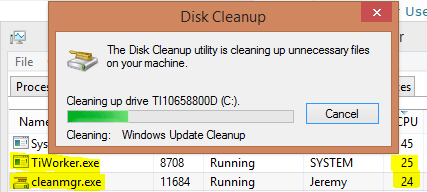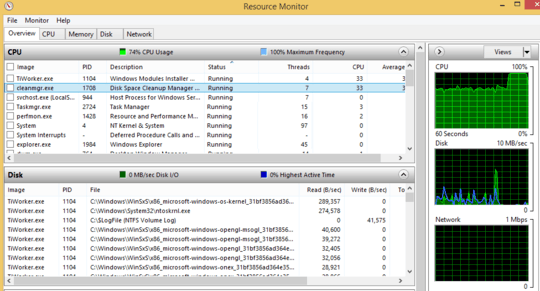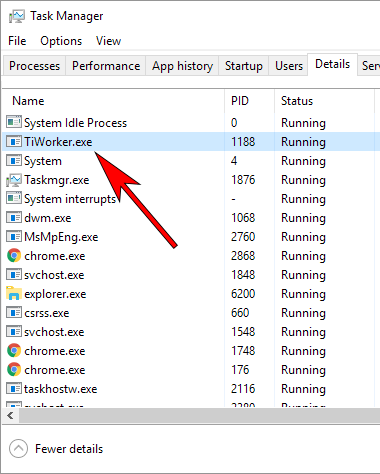Just to put fire on the question, i had done on an inmutable virtual machine the next steps:
- Boot a SystemRescueCD and mount the windows partition
- List all files on disk to a log file (less than a minute)
- Reboot onto Windows
- Let
cleanmgr do its job and take note of the time (more than eight hours)
- Reboot onto SystemRescueCD and mount the windows partition
- List all files on disk to another log file (less than a minute)
- Reset back the inmutable virtual machine
- Reboot onto Windows
- Do a FOR /F ... to delete such files in an admin command prompt (cmd) and take note of the time (less than five minutes)
Please note i rebooted onto Linux SystemRescueCd just to be able to list all files, also the ones looked by Window and also to do such listing as fast as possible (no acl check, etc).
Also please note that on cleanmgr i only count only time after search ends (the search itself also tooks more than six hours).
So deleting the files is not the botle neck (the delete itself only need five minutes but cleanmgr takes more than eight hours).
The delete it self can go so fast since the host is a Linux, that speed is caused just because Linux caches all writes to the fixed size file that is used as the disk on the virtual machine (24GiB), and since i have 64GiB of RAM and i let to the Windows 16GiB it does not need to use SWAP neither PAGEFILE.SYS; also more, Linux can hold the full file on RAM (i tested with that file on RAM and delete times go done a lot, but cleanmgr time does not drop down).
Yes, if i put the virtual disk totally on RAM, cleanmgr time does not drop but if i manaully delete the files, that time drops down just a little (Linux write cache is great when you have 64GiB of RAM on it).
My configuration for the tests:
- Host: Linux 64bits distro over a hardware that main parts are AMD Deca Core 5GHz with 64GiB of RAM and a Sata Raid0 controller with two WD VelociRaptor HDDs (able to sustain a combined secuential write speed of near 1GiB/s and a 4K random write of 300MiB/s); cost is >ten thousand euros
- Guest: Windows 10 Home with 16GiB of ram and a Virtual disk of 24GiB
Test1: Having the 24GiB virtual disk on the physical harddisks
Test2: Having the 24GiB virtual disk on the Linux host RAM
I am afraid that cleanmgr is doing something on the windows registry per each file it deletes (accessing the registry is very low).
Monitors i had:
- CPU usage on the Linux host and on the Windows Guest (most time between 0% and 1%, with pikes of 5%, no more)
- HDD usage on the Linux host (near 0% when
cleanmgr was working, with pikes of 2%), Linux disk cache is really great avoiding dato be sent to real disk
- HDD usage on the Windows guest (most time between 2% and 15% when
cleanmgr was working, with pikes of 28%)
So clearly cleanmgr is doing a lot of undetectable work, maybe sleep times? Maybe not, if it is accesiing registry, the CPU for that is not counted by Windows monitors, HDD on that is not used (registry is on RAM), etc., and each access to the registry can take more than a second... try your own program to access registry by opening the registry and closing it per each action versus letting the HK* opened... it is a great difference.
So if cleanmgr does for each file:
- Open registry HK*
- Consult whatever needs and/or do some writes on registry
- Close registry HK*
It can take as much as two or three seconds per operation, and if it does one operation per file, it can take near one hour per each thousand of files... my count of files was just a little bit more than 40000 files, so 40000 files / 8 hours is processing one file each 1.3 seconds... on the other side, deleting them on a script (after knowing wich ones) tooks less than five minutes, that is deleting about 133 per second... a hufe difference.
So definitly cleanmgr time is not caused by the deletion it self! What else is it doing? Please M$ improve that speed!



Doesn't it also calculate the space saved when compressing the oldest files (those not opened recently)? – Justin Goldberg – 10 years ago
Nice video! Will definitely check into that tool :D – Svish – 10 years ago
@Svish have you verified this? Is the question answered? – magicandre1981 – 9 years ago